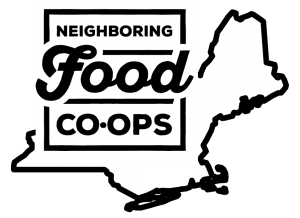 Your Neighboring Food Co-ops
Your Neighboring Food Co-ops
Locally Owned by More Than
150,000 People Like You!
In this Month’s E-News, check out:
- Urban Greens Co-op Market Opens in Providence, RI!
- NFCA’s Erbin Crowell Elected Chair of NCBA CLUSA
- Farm to Freezer: Make Your Own Popsicles
- Co-op Career Development: Enhancing Co-op Business Performance
- July’s Cave to Co-op Cheese Special
- Farmers Union: Fairness for Family Farmers
- Our Neighborhood Co-op Calendar
Urban Greens Co-op Market Opens in Providence, RI!
Urban Greens Co-op Market opened their doors to the Providence, RI, community on June 27th.
The Neighboring Food Co-op Association (NFCA) is excited to announce the 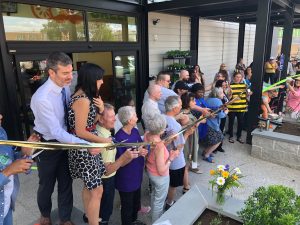 latest addition to our food co-op family! On June 27th, Urban Greens Co-op Market opened their doors to the community and NFCA staff were there, decked out in their finest Bee and Carrot costumes (see photo). Board members and local officials were on hand at the ribbon-cutting to celebrate with an enthusiastic crowd of co-op members and shoppers excited to explore their new 8,000-square-foot grocery store.
latest addition to our food co-op family! On June 27th, Urban Greens Co-op Market opened their doors to the community and NFCA staff were there, decked out in their finest Bee and Carrot costumes (see photo). Board members and local officials were on hand at the ribbon-cutting to celebrate with an enthusiastic crowd of co-op members and shoppers excited to explore their new 8,000-square-foot grocery store.
Urban Greens Co-op has made steady progress since it was incorporated in 2007, driven by a dedicated group of volunteers working with local government and organizations to bring a full-service community-owned grocery store to the West Providence, RI. Their dream: to make healthy, affordable food and co-operative membership more accessible to the whole community.
Along the way, they have been supported by the wider co-operative community including the NFCA, Food Co-op Initiative, Columinate, Cooperative Fund of New England, and Firebrand. Nearby Connecticut co-ops including Willimantic Food Co-op and Fiddleheads Food Co-op even sent staff to help get the store ready in the days before the opening.
“Almost a third of our members are startup initiatives like Urban Greens, demonstrating the growing interest across our region in healthy, local food and co-operative ownership,” said NFCA executive director, Erbin Crowell. “A central piece of what we do is working to support the success of these community-driven efforts.”
At the Grand Opening, the NFCA’s Bonnie Hudspeth congratulated the Co-op’s founding member-owners for taking their power back by creating and opening their food co-op — which they own and control together — and filling a missing link in RI’s food economy by supporting local farmers and producers year-round, while increasing the consistent availability of healthy, local, culturally-appropriate produce and products.
“Co-operatively owning our grocery stores means we are taking control over what types of foods our communities have access to, where our food comes from, and who our hard-earned money is supporting,” said Hudspeth. “Together, you are building community ownership, better jobs and a more inclusive economy!”
Check out photos of Urban Green Co-op Market’s new store and Grand Opening ceremony: www.facebook.com/Neighboring/photos/
Learn more about Urban Greens Co-op Market: urbangreens.com

Thanks to CoBank for their support of our Neighboring Food Co-ops
NFCA’s Erbin Crowell Elected Chair of NCBA CLUSA
The Board of Directors of the National Cooperative Business Association CLUSA International (NCBA CLUSA) is pleased to announce the election of Erbin Crowell, Executive Director of the Neighboring Food Co-op Association (NFCA) as the association’s new Board Chair.
“I am honored to have this opportunity to serve in this new role at such an
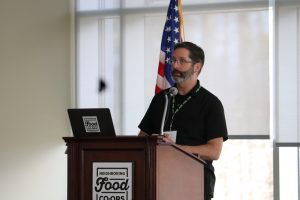
important time for our association and the wider co-operative community,” Crowell said.
Crowell succeeds Andrew Jacob, who served two terms as Chair of NCBA CLUSA’s Board of Directors. Jacob is Chief Regulatory, Legislative and Compliance Officer at CoBank.
“On behalf of the leadership and staff of NCBA CLUSA, I want to thank Andrew for his leadership, years of service and deep dedication to the continued success of our association,” said Doug O’Brien, president and CEO of NCBA CLUSA. “As we turn to new leadership, we congratulate Erbin on his appointment and are looking forward to working with him to fulfill our mission and vision that places co-operatives at the heart of a robust and inclusive economy.”
Crowell has served on the board since he was appointed in 2007; he was first elected by the membership in 2010, and most recently reelected in May as 1st Vice Chair. During that time, NCBA CLUSA celebrated its centenary, recruited new executive leadership, and embarked on a visioning process to guide the association into its next 100 years.
During that process, Crowell was instrumental in a series of strategic discussions designed to identify how co-ops and credit unions could be a more powerful force for good—socially, economically and environmentally. That process led the board to formally position NCBA CLUSA as an advocate for, collaborative partner in, and driver of an inclusive economy, as outlined by the Rockefeller Foundation.
“With this vision in place, we now have a strong platform to help us communicate what co-ops offer to the task of building a more inclusive economy that works for everyone,” he said.
Crowell began his co-operative career at Equal Exchange, a worker co-op and pioneer in Fair Trade, and has worked with the Co-operative Development Institute, the Cooperative Fund of New England, the Valley Alliance of Worker Co-ops, and as an independent consultant. In 2010 he was hired to incorporate and lead the Neighboring Food Co-op Association (NFCA), a co-operative federation based in Shelburne Falls, MA, that includes over 35 food co-ops and start-ups across New England and New York that are locally owned by more than 150,000 people. Together, these community owned grocery stores employ more than 2,300 people, generate annual revenues of $340 million, and sell over $93 million in local products.
Crowell holds a Master of Management: Co-operatives & Credit Unions from Saint Mary’s University in Nova Scotia and is an adjunct lecturer with the Department of Economics at the University of Massachusetts, Amherst, where he teaches courses on the co-operative movement. He also serves on the Board of Directors of the New England Farmers Union.
In his new role, Crowell is eager for NCBA CLUSA to more deeply engage co-ops and credit unions and their federations and associations in new areas of opportunity, impact, and influence.
“If we are going to grow co-operative enterprise, take advantage of new spaces in the economy that beg for our approach to doing business, and meet the needs of more people at this critical moment, we must do it together,” he said.
That means deepening and broadening NCBA CLUSA’s membership base and taking literally the 6th Co-operative Principle—Co-operation among Co-operatives—by using the power of association to “leverage our shared resources, knowledge and innovations for shared success and impact.”
Crowell would also like to see NCBA CLUSA lean into its mission to develop, advance and protect co-operative enterprise. “One of our most important assets is the co-operative identity or brand,” he said. “Moving forward, we will need to be proactive in our defense of the co-op name and take a leadership role in the stewardship of co-operative legal statutes as we seek new opportunities for growth and development.”
About NCBA CLUSA
The National Co-operative Business Association CLUSA International (NCBA CLUSA) is the primary voice in the United States for people who use co-operatives to build a better world through an inclusive economy. NCBA CLUSA protects, advances and promotes the co-operative business model, recognizing it as the equitable, sustainable, participatory and stable way to grow the economy. For more information on membership in for co-operatives, organizations, and individuals, please visit www.ncba.coop. NFCA member co-ops are eligible for a discount on member dues.
Now Offering Personal Impact Deposit Accounts

Open an account today and help increase access to local, healthy food, deliver health care to more people, create affordable housing and build renewable energy. Your Choices Reflect Your Values. Your Bank Should Too. Check our rates and Open an Account today.
Farm to Freezer: Make Your Own Popsicles
Keep it Cool! Make Your Own Popsicles
Summer means popsicles! With homemade popsicles you know just what  the ingredients are so you can meet dietary needs and still enjoy a cool treat.
the ingredients are so you can meet dietary needs and still enjoy a cool treat.
Your local food co-op has the ingredients you can use to create cool treats and keep local farms thriving. Cooling down with a healthy snack doesn’t have to mean high sugar and artificial dyes. Knowing what’s in your food is important and when you purchase the NFCA’s Northeast Grown Frozen Fruits & Vegetables, you are not only making a good decision for yourself and your family, you are helping to grow the local economy.
By working together, food co-ops across our region are making regionally grown produce available to our shoppers year ‘round. Eat healthy and contribute to community building! Look for our Northeast Grown Frozen Fruits and Vegetables in the freezer section. They’re easy to find because they’re packed in a clear package so you can see what’s inside!
Keep cool with easy to make popsicles. Our frozen blueberries are great for combining with ingredients to make popsicles, ready to help keep you cool this summer.
Easy to Remember Popsicle Recipe
- 1 cup fruit (NFCA Frozen Blueberries)
- 1 cup plain yogurt (or Coconut or Almond milk)
- 1 teaspoon maple syrup or honey (1 tablespoon for sweeter or when using tarter fruits)
- 1 teaspoon vanilla extract (optional)
Directions:
- Blend all ingredients in a food processor or blender on high speed until nearly liquified into a smoothie-like consistency.
- The mixture will be thick. Pour mixture into each popsicle mold. If you don’t have popsicle molds, you can use small paper cups. (for cups freeze for 2 hours, then insert a wooden popsicle stick in the middle).
- Continue to freeze for an additional 4-6 hours or overnight.
For more Farm to Freezer information and recipes — including warm weather recipes great for summer meals using frozen corn, peas, edamame, or blueberries — visit: www.nfca.coop/farmtofreezer.
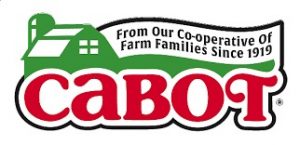
Thanks to Cabot Creamery Cooperative for their support of our Neighboring Food Co-ops
Co-op Career Development: Enhancing Co-op Business Performance
Ready for growth? Ready to move up into a new leadership position at your Co-op or Credit Union?
The Neighboring Food Co-op Association is hosting a second 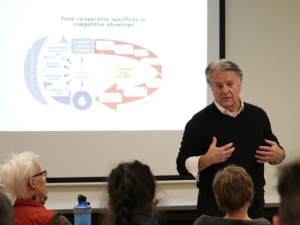 Annual training with Professor Daniel Côté of Saint Mary’s University, October 24 – 25, 2019 in Greenfield, MA.
Annual training with Professor Daniel Côté of Saint Mary’s University, October 24 – 25, 2019 in Greenfield, MA.
Enhancing Co-operative Business Performance: How to Strengthen Identity, Loyalty and Participation will be an interactive intensive professional development opportunity focused on learning new practices leading thinking in co-operative management coupled with tangible examples of how to translate knowledge into action.
“The Executive Education course gave me a chance to step outside the everyday routine of running a food co-op and learn with other co-operators, including those from other co-op sectors,” said Patty Smith, Operations Manager at the Willimantic Food Co-op (CT). “The focus on renewing our individual co-operative identities to stay relevant in today’s marketplace gave me many ah-ha! moments, and I came back to work with an enhanced view of the big co-op picture, as well as lots of new tactical ideas to improve my co-op’s operations.”
Who should come? Co-op General Managers/CEOs, Senior Managers, Board Members and Staff.
Registration is now open! Get More info & Register: https://nfca.coop/events/

Thanks to Cooperative Development Foundation for their support of our Neighboring Food Co-ops
July’s Cave to Co-op Cheese Special
Tubby from Spring Brook Farm, Vermont & Crown Finish Caves, New York
Tubby is a collaborative effort between Spring Brook Farm in Reading, 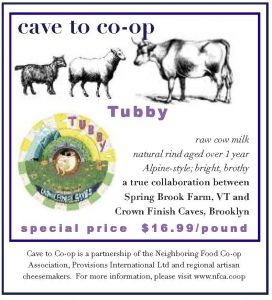 Vermont and Crown Finish Caves, Brookline, New York. The 30-pound Alpine-style cheese wheels are traditionally handmade in a copper vat and washed in brine for one year to encourage the development of beneficial microflora. Tubby’s paste is bright yet brothy with a rind like crunchy peanut butter that will leave you craving another bite.
Vermont and Crown Finish Caves, Brookline, New York. The 30-pound Alpine-style cheese wheels are traditionally handmade in a copper vat and washed in brine for one year to encourage the development of beneficial microflora. Tubby’s paste is bright yet brothy with a rind like crunchy peanut butter that will leave you craving another bite.
Crown Finish Caves is a cheese aging facility located in an 1850’s lagering tunnel thirty feet below the street in Brooklyn, located in the historic former Nassau Brewery building in Crown Heights. The caves are the old lagering tunnels of the brewery, and at approximately 50 degrees fahrenheit year-round, they are the perfect temperature for aging cheese. Crown Finish does not make cheese, they just age it; this is a centuries old practice called “affinage,” and is a prominent industry throughout Europe. Working together award-winning cheeses like Tubby result!
Tubby is named for one of Brooklyn’s prominent 19th century architects, William Bunker Tubby. Tubby’s buildings, like the cheese named for him, are regarded as distinguished and with excellent composition. Tubby melts well, so try it in your favorite mac ‘n cheese recipe, grilled-cheese or quesadilla.
Cave to Co-op is a partnership between Provisions International and the Neighboring Food Co-op Association (NFCA) to support artisanal cheese producers in our region and make their products more easily available to co-op shoppers. Each month, a delicious local cheese is featured at a great price.
For more information on Cave to Co-op, visit: www.nfca.coop/CaveToCo-op
Farmers Union: Fairness for Family Farmers
Farm & Food Organizations Call on Presidential Candidates to Increase Fairness for Family Farmers
Thirty-five farm and food organizations including the New England Farmers Union have called on elected officials and candidates running for 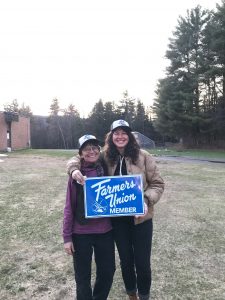 office to address the disproportionate market power held by the giant agribusinesses that dominate livestock and poultry markets. The list of priorities for creating fair and competitive markets for family farmers is endorsed by groups from across the country that represent producers raising livestock and poultry.
office to address the disproportionate market power held by the giant agribusinesses that dominate livestock and poultry markets. The list of priorities for creating fair and competitive markets for family farmers is endorsed by groups from across the country that represent producers raising livestock and poultry.
“Our food system is clearly rigged. While just a handful of multi-national corporations have been allowed to exert more and more control over every step of the agricultural supply chain, farmers and ranchers have been left to cope with higher production costs and fewer marketing choices as well as unfair and abusive business practices. These factors have contributed to the increasingly slim profit margins that have forced too many farms to close their doors. Between 2012 and 2017, nearly 70,000 farms went out of business, most of which were mid-sized, family-owned operations,” said National Farmers Union (NFU) President, Roger Johnson. “In light of these circumstances, it is critical that we act now to restore fair competition to agriculture. As the field of 2020 candidates vie for the presidency, we urge them to take the issue of corporate consolidation and anti-trust enforcement seriously by incorporating these recommendations into their platforms.”
The policy changes urged by the groups are needed because the largest meatpackers and processors control all stages of food animal production, forcing farmers into one-sided contracts that eliminate market transparency, depress prices, undermine the livelihoods of independent farmers and ranchers, and threaten farmers’ ability to adopt sustainable production practices.
“Our farm advocates have taken in hundreds of hotline calls from livestock and poultry producers in recent years struggling to make ends meet,” said Sally Lee, Associate Director of RAFI-USA. “These are hardworking farmers who are experts at what they do, but the marketplace has been rigged against them. Farmers deserve dignity and respect for their work, and we cannot let their basic rights be written off in the fine print of an unfair contract.”
The groups are calling on elected officials and candidates to support measures to rebalance the economic relationships between farmers, ranchers, consumers, workers, and food companies, including policies to:
- Enforce and strengthen antitrust and fair practice laws, including enforcement of the Packers & Stockyards Act.
- Ensure access to fair farm credit, including holding lenders accountable for equitable lending practices.
- Restore mandatory country-of-origin labeling for beef and pork.
- Stop subsidizing overproduction, including restricting government loan guarantees to large-scale contract operations.
- Break up food and agriculture monopolies, including instituting a moratorium on new mergers in the food and agriculture system.
- Stop subsidizing foreign corporations, by prohibiting federal procurement programs from buying meat from animals born, raised or slaughtered outside the U.S.
- Level the playing field for independent processors, including addressing the bias in food safety regulations toward large corporate slaughter and processing facilities.
“NSAC has long championed legislation and rules that maintain fair competition within the livestock industry,” said Candace Spencer, policy specialist for the National Sustainable Agriculture Coalition. “Without fair competition, livestock growers are forced to participate in a system built around inequitable pay and retaliation, with little to no recourse. We support the principles included in this document, which will help the livestock industry make major strides in increasing fairness for livestock growers, and urge elected officials and candidates to do the same.”
“As we enter another election cycle, it will be crucial that candidates hear the voices of our region’s producers and consumers,” said Roger Noonan, President of the New England Farmers Union. “Food co-ops and their members continue to be important partners for our farmers and fishermen, and I want to take this opportunity to thank all of our members. If you are not yet a member, now is an important time to join.”
* * * *
The New England Farmers Union Needs You!
If you care about where your food comes from and want to support the people who produce it, consider joining NEFU as a Friend of the Farmer for just $15. Your membership will help ensure that our region’s producers and consumers are heard by policy makers here at home and in Washington, DC. For more information, please visit www.newenglandfarmersunion.org.
The Neighboring Food Co-op Association (NFCA) is an affiliate member of the New England Farmers Union (NEFU), representing our commitment to collaboration among consumers and our region’s family farmers and fishermen to influence food system policy and build a more vibrant, resilient and co-operative food system in the Northeast.
Photo: Farmers Union Members Annie Galliard (Surfing Veggie Farm & Buffalo Mountain Food Co-op) & Marina Carleton (Buffalo Mountain Food Co-op).
Our Neighborhood Co-op Calendar
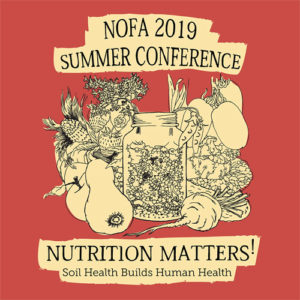 See you at the NOFA Summer Conference, August 10-12!
See you at the NOFA Summer Conference, August 10-12!
We’re looking forward to seeing you at the NOFA Summer Conference, where the Neighboring Food Co-op Association (NFCA) will offer a track of workshops on co-ops and their contribution to a more healthy, just & sustainable food system and economy.
Members-owners of NFCA Member Food Co-op receive 20% off conference registration using the code “COOP2019”!
For More Events visit https://nfca.coop/calendar
AUGUST 2019
Aug 10-12
NOFA Summer Conference, Amherst, MA
Sponsored by the NFCA. If you are a member of an NFCA Member Food Co-op, you can receive 20% off conference registration using the code “COOP2019”!
https://nofasummerconference.org
Aug 15-17, 2019
Federation of Southern Co-operatives 52nd Annual Meeting
SEPTEMBER 2019
Sep 25, 2019
Peer Training for NFCA Member Food Co-op Cheese Buyers, Brattleboro, VT
Save the Date — More Information Coming Soon!
OCTOBER 2019
OCTOBER IS CO-OP MONTH!
Oct 2-4
NCBA CLUSA Co-op Impact Conference
https://www.impactconference.coop
Oct 19
Co-op Cafe in Keene, NH
Co-Hosted by the NFCA
Oct 24-25
Saint Mary’s University Co-op Executive Education Training, Greenfield, MA
Enhancing Business Performance through Co-operative Management Practices
Hosted by the NFCA
The Neighboring Food Co-op Association (NFCA) is a co-operative federation of 35 food co-ops and start-up initiatives across New England, working together toward a shared vision of a thriving co-operative economy, rooted in a healthy, just, and sustainable food system and a vibrant community of co-operative enterprise.

